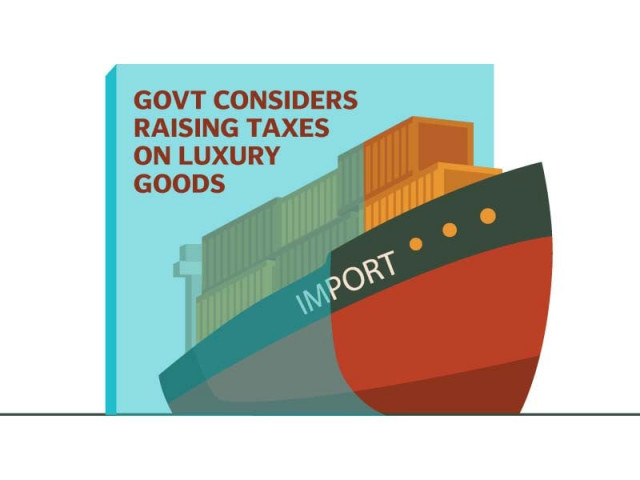Govt mulls increasing import taxes
Move comes following 21% increase in imports in August compared to July

The government is considering options to once again increase import taxes on ‘luxury goods’ or make it more difficult to import cars under baggage or gift schemes in an effort to curb imports, which have started to rise since last month.
Sources have informed The Express Tribune that proposals to disrupt the flow of imports through tariff and non-tariff barriers were discussed by interim Finance Minister Shamshad Akhtar. The move was initiated by the Commerce Ministry following a more than 21% increase in imports in August compared to the preceding month.
However, Pakistan Customs has informed the authorities that there would hardly be any benefit in curbing imports of luxury goods, as their value is not substantial enough to provide meaningful benefits. The meeting was informed that past experience has also shown that reducing formal imports of luxury goods through taxes led to a corresponding increase in imports of these goods through Afghan Transit Trade.
In May of last year, the government imposed a ban on 33 categories of goods covering 789 tariff lines, along with quota restrictions on the import of cars, cellular phones, and home appliances. Subsequently, the ban was lifted, and regulatory duties of up to 100% and additional customs duties of up to 35% were imposed. These additional duties also expired at the end of March this year.
The decision to increase duties and taxes to curb the import bill had not been very effective, as the State Bank of Pakistan (SBP) disallowed the opening of letters of credit (LC) for imports or availability of foreign currency. From September 2022 to February 2023, only $400 million worth of import compression could be achieved, with the country importing $300 million worth of goods during the enhanced duties period compared to $700 million in the same period, indicating a 57% reduction.
As part of a commitment to the International Monetary Fund (IMF), the central bank abolished all types of restrictions on imports in June, including withdrawing the priority list for opening letters of credit (LCs). In August, the import bill amounted to $4.5 billion, an increase of $784 million or 21% over July, according to the Pakistan Bureau of Statistics (PBS).
Sources indicate that the Federal Board of Revenue (FBR) has not supported the proposal to increase import duties, stating that duties have already reached their maximum level. The commerce ministry then proposed to further increase the sales tax rate on imported luxury goods from the current 25%. However, the FBR did not agree, as the World Trade Organisation (WTO) has already objected to discriminating against foreign manufacturers, whose goods are taxed at 25% while local goods are taxed at 18%.
According to sources, last week, the finance minister received advice that banks might be informally directed to discourage the import of luxury goods and instead open letters of credit only for goods needed for value addition. The role of smuggling and the misuse of the Afghan Transit Trade were also discussed by the finance minister on Monday. A meeting was also held in Rawalpindi on Tuesday to discourage the smuggling of goods, said sources.
The finance ministry is also reviewing the proposal to discourage the import of used cars through baggage, gift, and transfer of residence schemes. The FBR has been instructed to review the data on imports under these schemes before making a decision, said the sources.
Under these schemes, old and used cars not older than three years and other vehicles not older than five years can be imported, gifted, or brought to Pakistan by Pakistani nationals, including dual nationals. A person residing abroad for a minimum of 700 days in the immediately preceding three years can gift a vehicle to family members under this scheme. Similarly, a person residing abroad for a minimum of 180 days can import a vehicle into Pakistan under the baggage scheme.
Starting in April, Pakistan completely abolished regulatory duties on the import of used cars up to 1,800cc and reduced duty rates for new cars, mobile phones, and other goods. However, due to low production and poor quality of locally assembled cars, people have no choice but to import used cars. The current economic crisis has affected car consumers significantly.
Published in The Express Tribune, September 6th, 2023.
Like Business on Facebook, follow @TribuneBiz on Twitter to stay informed and join in the conversation.


















COMMENTS
Comments are moderated and generally will be posted if they are on-topic and not abusive.
For more information, please see our Comments FAQ